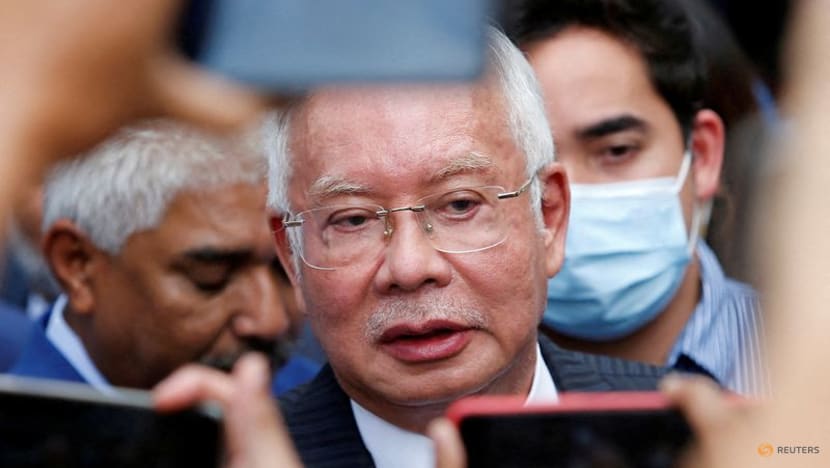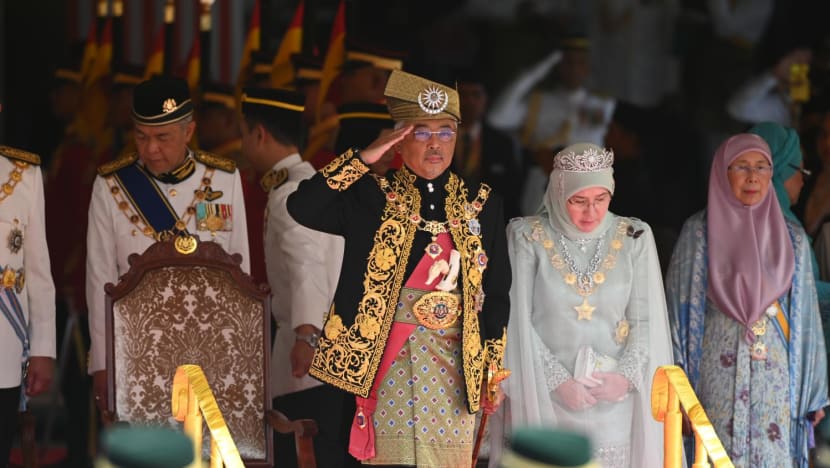exclusive Asia
Former Malaysian premier Najib Razak’s jail term halved from 12 to 6 years, say official sources
Najib Razak was convicted in 2020 of corruption charges related to the 1MDB scandal and began serving his prison term in August 2022.


This audio is generated by an AI tool.
- The partial royal pardon for Najib's role in the 1MDB case includes a reduction of his RM210 million (US$44.4 million) fine to an unspecified amount
- Najib has served less than two years of his prison term and could be out in August 2026, if granted parole for good behaviour
- The former prime minister is still believed to wield huge influence in UMNO, the party he led which is now part of Prime Minister Anwar Ibrahim’s unity government
KUALA LUMPUR: Former Malaysian prime minister Najib Razak’s jail sentence for corruption has been reduced from 12 to six years by the Pardons Board following its meeting on Monday (Jan 29), sources including senior government officials told CNA.
The decision by the board, which is headed by Malaysia’s king, includes a reduction of his RM210 million (US$44.4 million) fine to an unspecified amount, according to three separate sources who spoke on condition of strict confidentiality.
CNA reported on Jan 31, citing sources including senior government officials, that Najib will have his jail term halved and fine reduced under a partial royal pardon.
The partial royal pardon for his role in the 1Malaysia Development Berhad (1MDB) case comes after serving less than two years of his prison term.
The reduction means Najib is expected to complete his sentence in August 2028. But with parole for good behaviour, he could be out in August 2026 after serving two-thirds of the new jail term.
There has been feverish speculation about the pardon after Dr Zaliha Mustafa, Minister in the Prime Minister's Department (Federal Territories) confirmed on Tuesday that the board members including herself had met on Monday. She said an official announcement by the Pardons Board will be made.
The meeting was one of Sultan Abdullah Ri’ayatuddin’s last official tasks before he stepped down as Malaysia’s king on Jan 31 and handed the role to Johor ruler Sultan Ibrahim Sultan Iskandar under the country’s unique rotation system for its nine royal state households.
At a press conference on Wednesday evening, Home Affairs Minister Saifuddin Nasution Ismail told reporters the Cabinet discussed Najib’s royal pardon request, but said it is up to the Pardons Board to announce its decision.
At another press conference, Communications Minister and government spokesperson Fahmi Fadzil would not comment on whether a pardon decision has been made. “Let’s not jump the gun. Let us wait for an official statement to be made and follow that due process,” he said.
Najib's lead counsel Muhammad Shafee Abdullah said he has yet to be informed of any decision by the Pardons Board.
NAJIB’S INFLUENCE AND OUTSTANDING CHARGES
Najib, an ex-United Malays National Organisation (UMNO) president, is still believed to wield huge influence in the party, which is part of Prime Minister Anwar Ibrahim’s unity government.
He was Malaysia’s premier for nine years until May 2018 and its first PM to be imprisoned. He began serving his jail term in August 2022 after two failed appeals to overturn his conviction at a Malaysian High Court two years earlier.
The charges involved the transfer of RM42 million from SRC International, a former subsidiary of 1MDB, into his personal bank accounts in 2014 and 2015.
He was found guilty of three counts of criminal breach of trust, three counts of money laundering and one count of abuse of power by the High Court in July 2020, and was sentenced to 12 years in jail and fined RM210 million. The fine remains unsettled.
He is also facing several other charges in relation to the 1MDB scandal, including the laundering of RM27 million involving funds from SRC International.
Najib’s lawyers have applied to dismiss this money laundering case, and the court has said he can apply for an acquittal, or a discharge not amounting to an acquittal if prosecutors are not prepared to proceed with the trial in September, local media reported.
1MDB, Najib’s brainchild shortly after he became premier, turned into one of the biggest scandals to rock Malaysia and the international financial community. United States and Malaysian investigators estimate that more than US$4.5 billion was stolen from the fund and another US$1 billion flowed into accounts held by Najib.
Just days after Najib began serving his sentence at the Federal Prison of Kajang on the outskirts of Kuala Lumpur, he applied for a royal pardon.

This led to the change of heart among certain members of the Pardons Board, government officials close to the situation noted without elaborating. The application came before the Pardons Board in a meeting in December, but the matter was deferred to January.
Malaysia is a constitutional monarchy, giving the king the final word on the pardon of convicted criminals, a similar system that governs neighbouring Thailand.
A high-profile royal clemency was last handed down in mid-May 2018 when the then-king, Sultan Muhamad V of the Kelantan royal household, granted a full pardon to Mr Anwar.
The latter was at the time serving a five-year jail sentence from 2015 for alleged sexual misconduct, a charge many Malaysians believed was part of a conspiracy to keep him out of national politics.
Mr Anwar had earlier filed two separate petitions for a royal pardon, in 2015 and 2017, and both were rejected by the Pardons Board.
Additional reporting by Aqil Haziq Mahmud
















